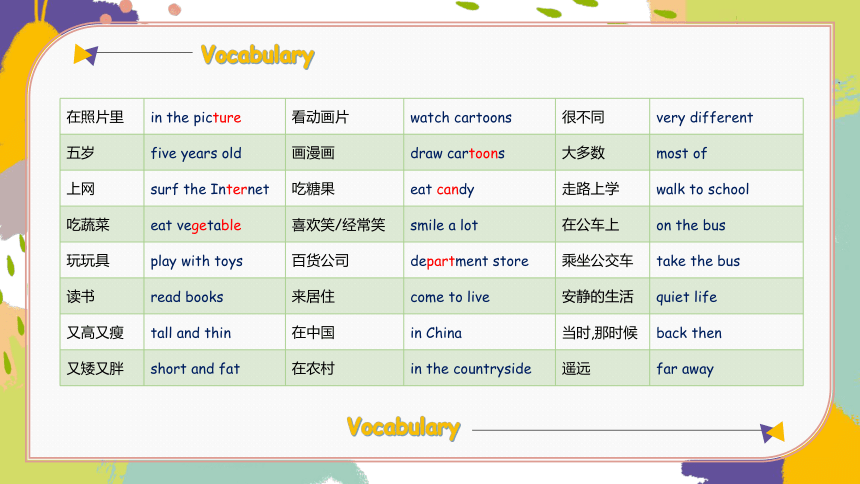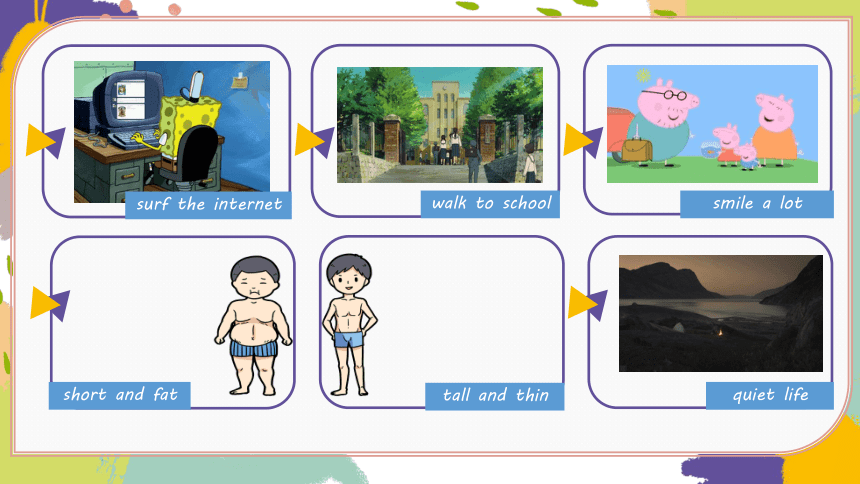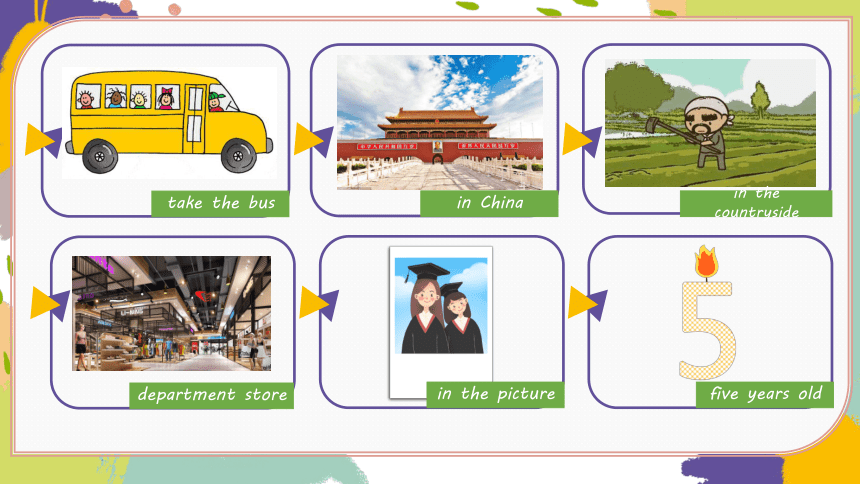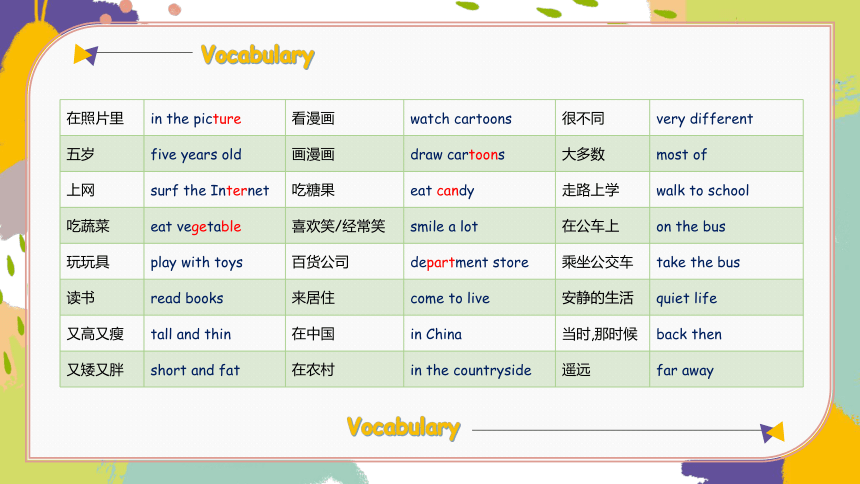小学英语教科版(广州)五年级上册 Module 5 Changes 课件(共17张PPT)
文档属性
| 名称 | 小学英语教科版(广州)五年级上册 Module 5 Changes 课件(共17张PPT) |

|
|
| 格式 | zip | ||
| 文件大小 | 29.4MB | ||
| 资源类型 | 教案 | ||
| 版本资源 | 教科版(广州) | ||
| 科目 | 英语 | ||
| 更新时间 | 2020-01-21 14:25:24 | ||
图片预览







文档简介
(共17张PPT)
Changes
Module5
Spring
2019.12.07
Vocabulary
Vocabulary
在照片里 in the picture 看动画片 watch cartoons 很不同 very different
五岁 five years old 画漫画 draw cartoons 大多数 most of
上网 surf the Internet 吃糖果 eat candy 走路上学 walk to school
吃蔬菜 eat vegetable 喜欢笑/经常笑 smile a lot 在公车上 on the bus
玩玩具 play with toys 百货公司 department store 乘坐公交车 take the bus
读书 read books 来居住 come to live 安静的生活 quiet life
又高又瘦 tall and thin 在中国 in China 当时,那时候 back then
又矮又胖 short and fat 在农村 in the countryside 遥远 far away
watch cartoons
draw cartoons
read books
eat vegetable
eat candy
play with toys
surf the internet
walk to school
smile a lot
short and fat
tall and thin
quiet life
take the bus
in China
in the countryside
department store
in the picture
five years old
Vocabulary
Vocabulary
在照片里 in the picture 看漫画 watch cartoons 很不同 very different
五岁 five years old 画漫画 draw cartoons 大多数 most of
上网 surf the Internet 吃糖果 eat candy 走路上学 walk to school
吃蔬菜 eat vegetable 喜欢笑/经常笑 smile a lot 在公车上 on the bus
玩玩具 play with toys 百货公司 department store 乘坐公交车 take the bus
读书 read books 来居住 come to live 安静的生活 quiet life
又高又瘦 tall and thin 在中国 in China 当时,那时候 back then
又矮又胖 short and fat 在农村 in the countryside 遥远 far away
Essay
Mum, who is that in the picture?
That's you, when you were five years old.
Really? My hair was very long then,wasn’t it?
Yes, it was. Before, you liked long hair very much, but now you always keep it short.
Was I a good girl back then?
Oh yes, a very good girl. When you were five, you were very quiet and very polite. But now…
But now? But now I am still very good!
拓展:
①继续;重复(keep doing sth.) keep smiling. 要保持微笑。
②保有;持有;不退还 I keep all her letters. 我把她所有的信都保留着。
③饲养;养 We keep some goats. 我们养了一些山羊。
1. But now you always keep it short.
如: keep quiet 保持安静 keep warm 保暖
2. 关于“看”的表达
watch TV 看电视
watch cartoon 看动画片
read books 看书,读书
read newspaper 看报纸
see movies 看电影
look at the blackboard 看黑板
①watch强调“专注地看”,有欣赏的意味,常用于看电视、看球赛等。
②read指“看”时实指“阅读”,常用于看书、看报等。
③see强调“看”的结果,意为“看见、看到”。
④look指集中注意力地看,是有意的,强调“看”的动作。单独使用时,用来引起对方的注意;如果跟宾语,要和at连用。
3. My hair was very long then, wasn’t it? 我的头发那时候很长,不是吗?
反意疑问句:由陈述句和附在其后的附加疑问句组成。
A. 句子结构:
①陈述部分肯定式+疑问部分否定式可记为前肯后否。They work hard, don’t they?
②陈述部分否定式+疑问部分肯定式可记为前否后肯。You didn't go, did you?
B. 如何回答:
回答:无论问题如何,如果事实是肯定的,就用yes,事实是否定的,就要用no。如:
—He likes playing football, doesn’t he? 他喜欢踢足球,不是吗?
—Yes, he does. / No, he doesn’t. 是的。/ 不是。
—His sister didn’t attend the meeting, did she? 他妹妹没有参加会议,是吗?
—Yes, she did. / No, she didn’t. 不,她参加了。/ 是的,她没参加。
Exercise
1.You aren’t in this school , _____________?
2.They study science at school, _____________?
3.It isn’t Monday today, _____________?
4.The old man can’t look after himself, _____________?
5.Your mother doesn’t teach maths, _____________?
are you
don’t they
is it
can he
does she
Exercise
( ) 1. I couldn't swim ______ I was young.
A. what B. which C. when D. where
( ) 2. Linda ate a lot this morning,______?
A. didn’t she B. was she C. did she D. wasn’t she
( ) 3. Tina is unhappy now, ______?
A. isn’t she B.is she C.is he D. did she
( ) 4. There ______ one classroom in the village school in 2000.
A. were B. are C. was D.is
( ) 5. They ______ play table tennis last Sunday.
A. didn’t B. don’t C. doesn’t D. weren’t
C
A
B
C
A
一、选择填空。
Exercise
1. Tom didn’t watch TV last night, ____________?
2. There’re twenty girl students in your class, _________________?
3. Everything is ready for the party, ____________?
4. They usually play football after school, _________________?
5. Lucy had a party last Sunday, ________________?
did he
aren’t there
isn’t it
don’t they
didn’t she
二、完成下列反意疑问句。
F
F
F
T
F
Len was thirty years old, and he had very long hair. He lived in a big city. Because of his long hair, he did not find any work. One day he met an old friend, and this man said to him, “People in this city don’t like long hair. Why don’t you go to a barber? He can cut a lot of it off, and then you can get some work” At the barber’s Len said to the barber, “Please cut most of my hair off.”
The barber began. He cut and cut for a long time and then he said to Len, “Were you in the army a few years ago?”
“Yes, I was.” Len answered, “Why did you ask that?”
“Because I found a cap in your hair.”
三、快速判断:
( )1. Len was old, so he did not find any work.
( )2. Len often wash his long hair.
( )3. Len’s hair was short.
( )4. Len’s barber found a cap in Len’s hair.
( )5. Len is in the army now.
Ben loves the city. There are many things to do and he has lots of friends. But sometimes he misses the quiet life of his English village.
Where does Ben come from?
2. Where did Ben live three years ago? And what about now?
3. Where did the people work in the small countryside?
4. How did Ben go to school three years ago? What about now?
Three years ago, Ben came to live in China with his parents. Before then, he lived in England and life was very different.
When he was in England, Ben lived in a small village in the countryside. It had only two shops and most of the people worked on farms. Ben’s village school was very small too. There were only 150 pupils. His home was nearby so he walked to school every day.
But now, Ben lives in a big city. The city has many people, cars and tall buildings. In the city, Ben goes to a very big school. It has more than 1000 pupils. His home is far away, so every day he takes the bus. On the bus, he sees people going to work in modern office buildings and department stores.
1. ago?…之前?? ago前面加时间段,用来表示过去的时间。
如:
a week ago??一周前????? a few days ago?几天前
2. 一般过去时:含有be动词的一般过去时表示过去存在的状态。
它的基本句型结构是“主语+was / were+其他.”
如:
She was in the park in the morning.
They were happy.
①否定句:主语+wasn’t / weren’t+其他.
如:
I wasn’t tired.
They weren’t happy.
②一般疑问句:Was / Were+主语+其他.
肯定回答:Yes, 主语+was / were.
否定回答:No, 主语+wasn’t / weren’t.
如:
-Were you tired? -Yes, I was.
-Were they happy? -No, they weren’t.
一、用be动词的适当形式填空。
1. I ______ an English teacher now.
2. She ______ happy yesterday.
3. They ______ glad to see each other last month.
4. Helen and Nancy ______ good friends.
5. Look, there ______ lots of grapes here.
6. There ______ a sign on the chair last Monday.
8. Today ______ the second of June. Yesterday ______ the first of June. It ______ Children’s Day. All the students ______ very excited.
Exercise
am
was
were
are
are
was
is
was
was
were
Vocabulary
Vocabulary
在照片里 in the picture 看漫画 watch cartoons 很不同 very different
五岁 five years old 画漫画 draw cartoons 大多数 most of
上网 surf the Internet 吃糖果 eat candy 走路上学 walk to school
吃蔬菜 eat vegetable 喜欢笑/经常笑 smile a lot 在公车上 on the bus
玩玩具 play with toys 百货公司 department store 乘坐公交车 take the bus
读书 read books 来居住 come to live 安静的生活 quiet life
又高又瘦 tall and thin 在中国 in China 当时,那时候 back then
又矮又胖 short and fat 在农村 in the countryside 遥远 far away
Changes
Module5
Spring
2019.12.07
Vocabulary
Vocabulary
在照片里 in the picture 看动画片 watch cartoons 很不同 very different
五岁 five years old 画漫画 draw cartoons 大多数 most of
上网 surf the Internet 吃糖果 eat candy 走路上学 walk to school
吃蔬菜 eat vegetable 喜欢笑/经常笑 smile a lot 在公车上 on the bus
玩玩具 play with toys 百货公司 department store 乘坐公交车 take the bus
读书 read books 来居住 come to live 安静的生活 quiet life
又高又瘦 tall and thin 在中国 in China 当时,那时候 back then
又矮又胖 short and fat 在农村 in the countryside 遥远 far away
watch cartoons
draw cartoons
read books
eat vegetable
eat candy
play with toys
surf the internet
walk to school
smile a lot
short and fat
tall and thin
quiet life
take the bus
in China
in the countryside
department store
in the picture
five years old
Vocabulary
Vocabulary
在照片里 in the picture 看漫画 watch cartoons 很不同 very different
五岁 five years old 画漫画 draw cartoons 大多数 most of
上网 surf the Internet 吃糖果 eat candy 走路上学 walk to school
吃蔬菜 eat vegetable 喜欢笑/经常笑 smile a lot 在公车上 on the bus
玩玩具 play with toys 百货公司 department store 乘坐公交车 take the bus
读书 read books 来居住 come to live 安静的生活 quiet life
又高又瘦 tall and thin 在中国 in China 当时,那时候 back then
又矮又胖 short and fat 在农村 in the countryside 遥远 far away
Essay
Mum, who is that in the picture?
That's you, when you were five years old.
Really? My hair was very long then,wasn’t it?
Yes, it was. Before, you liked long hair very much, but now you always keep it short.
Was I a good girl back then?
Oh yes, a very good girl. When you were five, you were very quiet and very polite. But now…
But now? But now I am still very good!
拓展:
①继续;重复(keep doing sth.) keep smiling. 要保持微笑。
②保有;持有;不退还 I keep all her letters. 我把她所有的信都保留着。
③饲养;养 We keep some goats. 我们养了一些山羊。
1. But now you always keep it short.
如: keep quiet 保持安静 keep warm 保暖
2. 关于“看”的表达
watch TV 看电视
watch cartoon 看动画片
read books 看书,读书
read newspaper 看报纸
see movies 看电影
look at the blackboard 看黑板
①watch强调“专注地看”,有欣赏的意味,常用于看电视、看球赛等。
②read指“看”时实指“阅读”,常用于看书、看报等。
③see强调“看”的结果,意为“看见、看到”。
④look指集中注意力地看,是有意的,强调“看”的动作。单独使用时,用来引起对方的注意;如果跟宾语,要和at连用。
3. My hair was very long then, wasn’t it? 我的头发那时候很长,不是吗?
反意疑问句:由陈述句和附在其后的附加疑问句组成。
A. 句子结构:
①陈述部分肯定式+疑问部分否定式可记为前肯后否。They work hard, don’t they?
②陈述部分否定式+疑问部分肯定式可记为前否后肯。You didn't go, did you?
B. 如何回答:
回答:无论问题如何,如果事实是肯定的,就用yes,事实是否定的,就要用no。如:
—He likes playing football, doesn’t he? 他喜欢踢足球,不是吗?
—Yes, he does. / No, he doesn’t. 是的。/ 不是。
—His sister didn’t attend the meeting, did she? 他妹妹没有参加会议,是吗?
—Yes, she did. / No, she didn’t. 不,她参加了。/ 是的,她没参加。
Exercise
1.You aren’t in this school , _____________?
2.They study science at school, _____________?
3.It isn’t Monday today, _____________?
4.The old man can’t look after himself, _____________?
5.Your mother doesn’t teach maths, _____________?
are you
don’t they
is it
can he
does she
Exercise
( ) 1. I couldn't swim ______ I was young.
A. what B. which C. when D. where
( ) 2. Linda ate a lot this morning,______?
A. didn’t she B. was she C. did she D. wasn’t she
( ) 3. Tina is unhappy now, ______?
A. isn’t she B.is she C.is he D. did she
( ) 4. There ______ one classroom in the village school in 2000.
A. were B. are C. was D.is
( ) 5. They ______ play table tennis last Sunday.
A. didn’t B. don’t C. doesn’t D. weren’t
C
A
B
C
A
一、选择填空。
Exercise
1. Tom didn’t watch TV last night, ____________?
2. There’re twenty girl students in your class, _________________?
3. Everything is ready for the party, ____________?
4. They usually play football after school, _________________?
5. Lucy had a party last Sunday, ________________?
did he
aren’t there
isn’t it
don’t they
didn’t she
二、完成下列反意疑问句。
F
F
F
T
F
Len was thirty years old, and he had very long hair. He lived in a big city. Because of his long hair, he did not find any work. One day he met an old friend, and this man said to him, “People in this city don’t like long hair. Why don’t you go to a barber? He can cut a lot of it off, and then you can get some work” At the barber’s Len said to the barber, “Please cut most of my hair off.”
The barber began. He cut and cut for a long time and then he said to Len, “Were you in the army a few years ago?”
“Yes, I was.” Len answered, “Why did you ask that?”
“Because I found a cap in your hair.”
三、快速判断:
( )1. Len was old, so he did not find any work.
( )2. Len often wash his long hair.
( )3. Len’s hair was short.
( )4. Len’s barber found a cap in Len’s hair.
( )5. Len is in the army now.
Ben loves the city. There are many things to do and he has lots of friends. But sometimes he misses the quiet life of his English village.
Where does Ben come from?
2. Where did Ben live three years ago? And what about now?
3. Where did the people work in the small countryside?
4. How did Ben go to school three years ago? What about now?
Three years ago, Ben came to live in China with his parents. Before then, he lived in England and life was very different.
When he was in England, Ben lived in a small village in the countryside. It had only two shops and most of the people worked on farms. Ben’s village school was very small too. There were only 150 pupils. His home was nearby so he walked to school every day.
But now, Ben lives in a big city. The city has many people, cars and tall buildings. In the city, Ben goes to a very big school. It has more than 1000 pupils. His home is far away, so every day he takes the bus. On the bus, he sees people going to work in modern office buildings and department stores.
1. ago?…之前?? ago前面加时间段,用来表示过去的时间。
如:
a week ago??一周前????? a few days ago?几天前
2. 一般过去时:含有be动词的一般过去时表示过去存在的状态。
它的基本句型结构是“主语+was / were+其他.”
如:
She was in the park in the morning.
They were happy.
①否定句:主语+wasn’t / weren’t+其他.
如:
I wasn’t tired.
They weren’t happy.
②一般疑问句:Was / Were+主语+其他.
肯定回答:Yes, 主语+was / were.
否定回答:No, 主语+wasn’t / weren’t.
如:
-Were you tired? -Yes, I was.
-Were they happy? -No, they weren’t.
一、用be动词的适当形式填空。
1. I ______ an English teacher now.
2. She ______ happy yesterday.
3. They ______ glad to see each other last month.
4. Helen and Nancy ______ good friends.
5. Look, there ______ lots of grapes here.
6. There ______ a sign on the chair last Monday.
8. Today ______ the second of June. Yesterday ______ the first of June. It ______ Children’s Day. All the students ______ very excited.
Exercise
am
was
were
are
are
was
is
was
was
were
Vocabulary
Vocabulary
在照片里 in the picture 看漫画 watch cartoons 很不同 very different
五岁 five years old 画漫画 draw cartoons 大多数 most of
上网 surf the Internet 吃糖果 eat candy 走路上学 walk to school
吃蔬菜 eat vegetable 喜欢笑/经常笑 smile a lot 在公车上 on the bus
玩玩具 play with toys 百货公司 department store 乘坐公交车 take the bus
读书 read books 来居住 come to live 安静的生活 quiet life
又高又瘦 tall and thin 在中国 in China 当时,那时候 back then
又矮又胖 short and fat 在农村 in the countryside 遥远 far away
同课章节目录
- Module 1 Country life
- Unit 1 What are those farmers doing?
- Unit 2 A country life is a healthy life
- Module 2 City life
- Unit 3 Where are you from?
- Unit 4 I like the city very much
- Module 3 Health
- Unit 5 What's the matter with you?
- Unit 6 The secret of good health
- Module 4 Past experiences
- Unit 7 What did you do yesterday?
- Unit 8 A trip to Hong Kong
- Module 5 Changes
- Unit 9 Was I a good girl back then?
- Unit 10 Then and now
- Module 6 Festivals
- Unit 11 I like the Spring Festival best
- Unit 12 Other festival in China
- Unit 12 Christmas(旧版)
- Module 7 Let's look back
